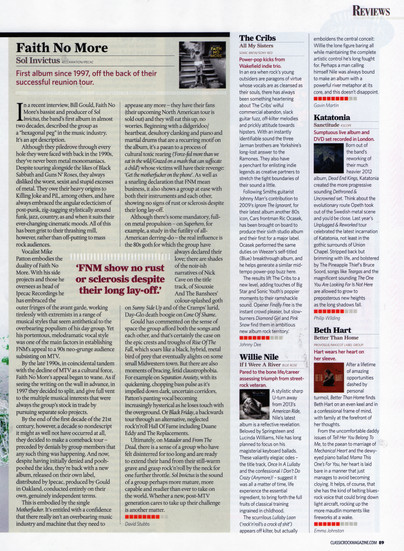Classic Rock | April 2015
- Faith No More Followers

- Mar 29, 2024
- 3 min read
First album since 1997, off the back of their successful reunion tour
David Stubbs
In a recent interview, Bill Gould, Faith No More's bassist and producer of Sol Invictus, the band's first album in almost two decades, described the group as a "hexagonal peg" in the music industry. It's an apt description. Although they piledrove through every hole they were faced with back in the 1990s, they've never been metal monomaniacs.
Despite touring alongside the likes of Black Sabbath and Guns N' Roses, they always disliked the worst, sexist and stupid excesses of metal. They owe their heavy origins to Killing Joke and PiL, among others, and have always embraced the angular eclecticism of post-punk, zig-zagging stylistically around funk, jazz, country, as and when it suits their ever-changing cinematic moods. All of this has been grist to their thrashing mill, however, rather than off-putting to mass rock audiences.
Vocalist Mike Patton embodies the duality of Faith No More. With his side projects and those he oversees as head of Ipecac Recordings he has embraced the outer fringes of the avant garde, working tirelessly with extremists in a range of musical styles that seem antithetical to the overbearing populism of his day group. Yet his portentous, melodramatic vocal style was one of the main factors in establishing FNM's appeal to a 90s neo-grunge audience subsisting on MTV.
By the late 1990s, in coincidental tandem with the decline of MTV as a cultural force, Faith No More's appeal began to wane. As if seeing the writing on the wall in advance, in
1997 they decided to split, and give full vent to the multiple musical interests that were always the group's stock in trade by pursuing separate solo projects.
By the end of the first decade of the 21st century, however, a decade so nondescript it might as well not have occurred at all, they decided to make a comeback tour preceded by denials by group members that any such thing was happening. And now, despite having initially denied and pooh-poohed the idea, they're back with a new album, released on their own label, distributed by Ipecac, produced by Gould in Oakland, conducted entirely on their own, genuinely independent terms.
This is embodied by the single Motherfucker. It's entitled with a confidence that there really isn't an overbearing music industry and machine that they need to appease any more - they have their fans (their upcoming North American tour is sold out) and they will eat this up, no worries. Beginning with a didgeridoo/heartbeat, desultory clanking and piano and martial drums that are a recurring motif on the album, it's a paean to a process of cultural toxic rearing ('Force-fed more than we eat in the wild/Grazed on a mash that can suffocate a child') whose victims will have their revenge: 'Get the motherfucker on the phone'. As well as a snarling declaration that FNM mean business, it also shows a group at ease with both their instruments and each other, showing no signs of rust or sclerosis despite their long lay-off.
Although there's some mandatory, full on metal propulsion - on Superhero, for example, a study in the futility of all American derring-do - the real influence is the 80s goth for which the group have always declared their love; there are shades of the noir-ish narratives of Nick Cave on the title track, of Siouxsie And The Banshees' colour-splashed goth on Sunny Side Up and of the Cramps' lurid, Day-Glo death boogie on Cone Of Shame.
Gould has commented on the sense of space the group afford both the songs and each other, and that's certainly the case on the epic crests and troughs of Rise Of The Fall, which soars like a black, hybrid, metal bird of prey that eventually alights on some small Midwestern town. But there are also moments of bracing, fetid claustrophobia.
For example on Separation Anxiety, with its quickening, chopping bass pulse as it's impelled down dark, uncertain corridors, Patton's panting vocal becoming increasingly hysterical as he loses touch with the overground. Or Black Friday, a backwards tour through an alternative, neglected rock'n'roll Hall Of Fame including Duane Eddy and The Replacements.
Ultimately, on Matador and From The Dead, there is a sense of a group who have felt disinterred for too long and are ready to extend their hand from their still-warm grave and grasp rock'n'roll by the neck for one further throttle. So! Invictus is the sound of a group perhaps more mature, more capable and readier than ever to take on the world. Whether a new, post-MTV generation cares to take up their challenge is another matter.







Comments